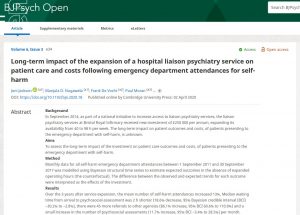Self-harm patients benefit from liaison psychiatry service hours extension
24 April 2020
Extending the operating hours of the psychiatric liaison service at the Bristol Royal Infirmary’s (BRI) emergency department reduced waiting times and increased referrals and assessments for patients who had self-harmed, an evaluation by the National Institute for Health and Care Research Applied Research Collaboration West (NIHR ARC West) has found.
Most emergency department patients who have self-harmed present outside office hours and are less likely to receive specialist assessment and aftercare. People who visit the BRI’s emergency department because of self-harm are the patient group at highest risk of suicide. They make up a high proportion of the liaison team’s workload and may have to wait in the emergency department or be admitted to hospital if they can’t have a timely psychiatric assessment.
Published in BJPsych Open, this evaluation is the first long-term assessment of the impact of changes to the BRI’s service made in 2014, when operating hours were extended from 40 hours over five days to 98 hours over seven days a week, at an additional investment of around £250,000 a year.
Patients who have self-harmed make up 40 per cent of referrals to the BRI’s liaison psychiatry team. The evaluation looked at the longer-term impact of the service change on these patients, using detailed data collected through the local self-harm register between 2014 and 2017.
Overall, it showed that the waiting time from arriving in the BRI’s emergency department to being assessed by the liaison psychiatry team was around two hours shorter a month. It also found there were about 45 more referrals to other agencies a month and about seven more assessments a month.
While it also showed an increase in the average cost of a psychosocial assessment, there was little evidence of an increase in the average hospital costs for an attendance overall. A larger study would be needed to provide stronger evidence.
Joni Jackson, research associate at NIHR ARC West and the evaluation lead, said:
“Our study will help commissioners across England judge whether further investment in liaison psychiatric services represents value for money.
“Further research that looks at whether there were improvements in patients’ health, and follow-up care of people who attend the emergency department for self-harm, along with other patient groups referred to the liaison psychiatry service, would provide a more complete picture.”
Paper
